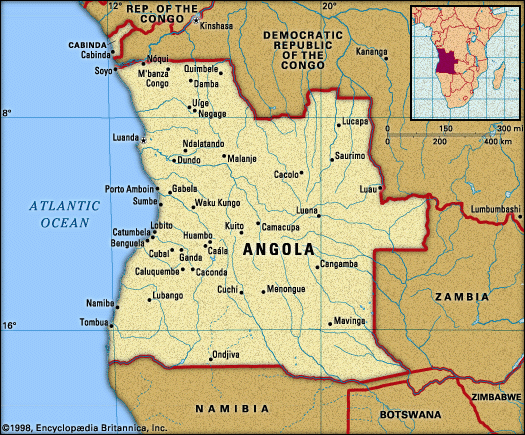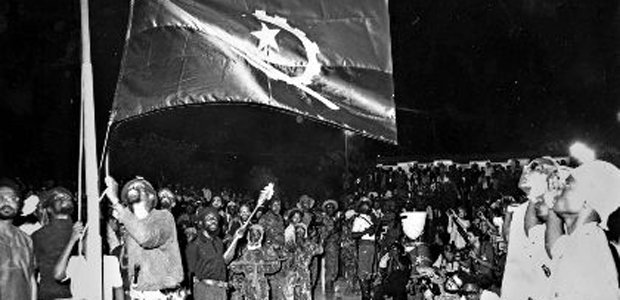The independence process of Angola
The independence process of Angola

The African continent has been marked by his rich history, from the early African kingdoms, such as Ethiopia and Mali to the great pyramids of Egypt. However, African history was not always marked by glorious moments. Colonization by European countries dived the continued and stripped Africans of their rights. African had to fight for their rights and the claim to their lands. Numerous African countries went to a decolonization process that marked the continent and global history. Angola was one those countries that won his independence through the blood and courage of the Angolan population. On this paper, I will explain how the Angolan people achieved their independence from Portugal.

Angola is a country located in Southern Africa, most his population is a descendant of the Banto Ethnical group. The country is very rich in natural resources such as oil and diamonds. Angola has been in contact with the Portuguese since the 15th century, the first Portuguese came in contact with Angola, which at the time was the kingdom of Congo came in 1492. Their principal interest in the land was to trade and to expand their Christian beliefs to the natives. In 1885, the Berlin Conference established the Angolan colony's borders, and Portugal had the political and social control of the Angolan's land. The Portuguese governed Angola with the approach that Angola was just another province of Portugal. They establish rules to enforce the Angolan native population to speak Portuguese and convert to Christianity, with the promise that black and whites were to be treated equally if they follow the Portuguese costumes. However, that was not observed Angolan native was still treated as a minority with discrimination and forced labor. In the 60's, numerous African colonies had claimed their independence, and global organization started to pressure Portugal to free the Angolan people, which were resisted by the Portuguese empire. However, Angolans were inspired by the independence of those African countries and started to plot they own.

Liberations movements started to exist in Angola in the 1950's and 1960's. Those movements were led by Angolan intellectuals who most of the study abroad and had acquired different political views and had the desire to free Angola from colonization. Those young intellectuals started to form political movements, the movements where, MPLA, FNLA, and UNITA. MPLA was led by Agostinho Neto and had a Marxist, communist view and was supported by Cuba and URSS. FNLA was led by Holden Roberto and had Centrism political view and was supported by the USA and Maoist China. UNITA was led by Jonas Savimbi with a capitalism view and was supported by the United States. Together these movements fought for Angola independence in a 14 years war.
The War for independece officially started on February 4th of 1961 when MPLA soldier attacked a prison in Luanda in an attempt to free African political prisoners. Violence spread across the country and a guerrilla war started killing thousands of Angolans.
At the same time Portugal was ruled by an authoritarian government and was going through a revolution, the Portuguese empire was no longer able to sustain wars with their colonies which led to thousands of Portuguese soldiers dead. Thus, the Portuguese army took over the government in a peaceful revolution on April 25, 1974, starting the Portuguese revolution.
In 1974 came the promise of independence for Angola, and the Angolan soldiers agree to seize fire. The dream day for millions of Angolans came on November 11, 1975, when the leader of the MPLA Augostinho Neto proclaimed their independence. It was signed an agreement "the Alvor Agreement," that transited the government to the Angolan political movements the MPLA, UNITA, and the FNLA; Finally, Angolans had the power to control their destiny.

Bibliography
Abbott, P. E., and Manuel Ribeiro. Rodrigues. Modern African Wars (2): Angola and Moçambique 1961-1974. London: Osprey, 1988. Print.
Collelo, Thomas. "Angola - COALITION, THE TRANSITIONAL GOVERNMENT, AND CIVIL WAR." Angola - COALITION, THE TRANSITIONAL GOVERNMENT, AND CIVIL WAR. U.S. Library of Congress, 1991. Web. 18 June 2015.
Pearce, J. "Control, Politics and Identity in the Angolan Civil War." African Affairs 111.444 (2012): 442-65. Academic Search. Web. 16 June 2015.
Wheeler, Douglas, and René Pélissier. Historia De Angola. Vol. 1. Lisbon: Tinta-da-China, 2009. Print.
Congratulations @ivocastro! You have completed some achievement on Steemit and have been rewarded with new badge(s) :
Click on any badge to view your own Board of Honor on SteemitBoard.
For more information about SteemitBoard, click here
If you no longer want to receive notifications, reply to this comment with the word
STOPCongratulations @ivocastro! You have received a personal award!
Click on the badge to view your Board of Honor.
Congratulations @ivocastro! You received a personal award!
You can view your badges on your Steem Board and compare to others on the Steem Ranking
Vote for @Steemitboard as a witness to get one more award and increased upvotes!